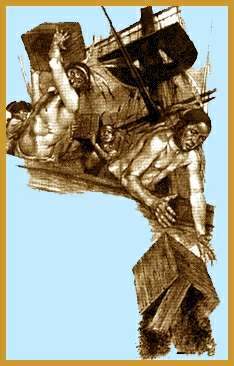|
PinkMonkey Study Guide - American History
3. 2 The Events Leading to the War of Independence
The Gaspee Incident
Due to the strong anti-British feelings aroused
by the Townshend Acts, the Parliament in London was compelled to
repeal it. And for years, there was peace between the colonies and
the mother country. Hostile feelings surfaced, when in 1772, the
"Gaspee" incident shook the British throne. This incident
occurred in Rhode Island. To stop the smuggling of goods from the
numerous coves and inlets of the Island, the British Government
had sent a ship "Gaspee" to guard the seacoast of Rhode
Island. Due to the tide, the ship was pushed onto a sandbar. When
some of the members of the "sons of Liberty" group, Rhode
Island, heard this, they took over the stranded ship, arrested the
captain with his crew, and set the ship on fire.
The king was shocked. The British government immediately
instructed a commission of inquiry, to investigate the "Gaspee"
affair. Further, it gave the commission the power to send suspects
to England for a trial. But the commission could not do much in
America, because witnesses to the incident refused to testify against
the people involved in the incident. So the committee had to return
home midway. The incident only served to anger the ’Patriots’ further.
Another interesting phenomenon that resulted due
to the Gaspee affair was that a committee of correspondence was
set up in each colony. The committee consisted of men who decided
to send and receive messages on matters concerning mutual concern.
This network of responsible patriots went on to play a leading role
in the struggle against Britain.
The Boston Tea Party
In 1773, Britain passed the Tea Act. By this Act, about 17 million pounds of surplus tea (assets of the East India Company, India) was proposed to be sold in America, by under selling it. Since the tea would be sold at an extremely cheap rate by bypassing the traders, the wholesalers in America were going to be seriously affected. For this reason, the Act was fiercely resisted by the colonies. Since British tea was already being boycotted because of the heavy duties on it, the Act in America was seen as a bribe from the British Authorities.
In Boston, the opposition against the Tea Act took a dramatic form. Here some men dressed as Indians boarded a ship containing tea, at the Harbor and dumped the entire consignment into the sea. This incident is known as the Boston Tea Party. While the people in Boston rejoiced, the British Parliament passed certain laws to punish the colony. They passed what the colonists popularly called the Intolerable Acts in 1774. Under these Acts, the Boston port was closed until due compensation was paid to the government (London) for the lost tea. Further, the British troops were re-stationed in the city.
The Boston Tea Party

Exhibit 3.1
These measures were just the first few in a series of laws passed
by the parliament in Britain. The British authorities, under the Administration
of Justice Act - announced that if any royal official in the colonies
was prevented from carrying out their duties the suspects could be
brought to Britain for a trial. Besides, the Massachusetts Government
Act gave a hard blow to the self-government (in Massachusetts)
by depriving its legislature of many powers. Instead, a royal governor
was appointed - who had the sole right to call town meetings. Members
of the Jury, who were always elected in Massachusetts, were now, to
be summoned by the sheriff.
These Acts obviously, made the colonies furious. Something, had to be done to fight the unjust, ’Intolerable Acts.’
[Next Page]
|
Table of Contents
3.0
- Chronology of Major Events in this Period
3.1 - Causes
3.2 - The Events Leading tothe war of Independence
3.3 - The First Continental Congress
3.4 - The declaration of Independence
3.5 - The Course of the War
3.6 - War and Peace
3.7 - Articles ofConfederation
3.8 - The Formation and Ratification
of the Constitution
3.9 - Points to Remember
Chapter 4
|